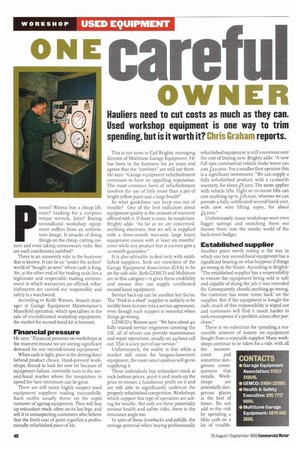USED EQUIPMENT
Page 42

If you've noticed an error in this article please click here to report it so we can fix it.
ONE careful
OWNER
Hauliers need to cut costs as much as they can.
Used workshop equipment is one way to trim spending, hut is it worth it? Chris Graham reports.
pssssst! Wantizi buy a cheap lift, mate? Looking for a cut-price torque wrench, John? Buying secondhand workshop equipment suffers from an unfortunate image. It smacks of doing things on the cheap, cutting corners and even taking unnecessary risks. But are such conclusions justified?
There is an unseemly side to the business that is known. It can be an "under the arches" world of "bought as seen" where cash is king. Yet, at the other end of the trading scale lies a legitimate and respectable trading environment in which warranties are offered, refurbishments are carried out responsibly and safety is a watchword.
According to Keith Watson, branch manager .at Garage Equipment Maintenance's Mansfield operation, which specialises in the sale of reconditioned workshop equipment, the market for second-hand kit is buoyant.
Financial pressure
He says: "Financial pressure on workshops at the moment means we are seeing significant demand for our reconditioned equipment."
When cash is tight, price is the driving force behind product choice. Hard-pressed workshops, forced to look for new kit because of equipment failure, inevitably turn to the second-hand market where the temptation to spend the bare minimum can be great.
There are still many highly suspect used equipment suppliers trading successfully. Such outfits usually thrive on the rapid turnover of ageing equipment. They will buy up redundant stock, often on its last legs, and sell it to unsuspecting customers who believe that the fresh coat of paint signifies a professionally refurbished piece of kit.
This is not news to Carl Brighty, managing director of Multitune Garage Equipment. He has been in the business for zo years and agrees that the "cowboys" are still out there. He says: "Garage equipment refurbishment continues to have an appalling reputation. The most common form of refurbishment involves the use of little more than a pot of bright yellow paint and a large brush!"
So what guidelines can keep you out of trouble? One of the best indicators about equipment quality is the amount of warranty offered with it. If there is none, be suspicious. Blighty adds: "As far as we are concerned, anything electronic that we sell is supplied with a three-month warranty, large heavy equipment comes with at least six months' cover while any product that is current gets a tz-month guarantee."
It is also advisable to deal only with established suppliers. Seek out members of the Garage Equipment Association (GEA) to be on the safe side. Both GEMCO and Multitune are in this category—it gives them credibility and means they can supply certificated second-hand equipment.
Service back-up can be another key factor. The "Fred in a shed" supplier is unlikely to be terribly keen to enter into a service agreement, even though such support is essential when things go wrong.
GEMCO's Watson says: "We have about 40 fully trained service engineers covering the UK, all of whom can provide maintenance and repair operations, usually on 24-hour call out. This is a key part of our service."
Unfortunately, the reality is that while a market still exists for bargain-basement equipment, the more unscrupulous will go on supplying it.
These individuals buy redundant stock at rock-bottom prices, paint it and mark-up the price to ensure a handsome profit on it and are still able to significantly undercut the properly refurbished competition. Workshops which support this type of operation are asking for trouble. Not only are there potentially serious health and safety risks, there is the insurance angle too.
In spite of these drawbacks and pitfalls, the savings potential when buying professionally refurbished equipment is still enormous over the cost of buying new. Brighty adds: "A new full spec commercial vehicle brake tester can cost £22,000. For a smaller fleet operator this is a significant investment. "We can supply a fully refurbished product, with a tz-month warranty, for about £8,500. The same applies with vehicle lifts. Eight or to-tonne lifts can cost anything up to £18,000, whereas we can provide a fully certificated second-hand unit, with new wire lifting ropes, for about £5,000."
Unfortunately, many workshops want even bigger savings and searching them out throws them into the murky world of the back-street bodger.
Established supplier
Another point worth noting is the way in which you buy second-hand equipment has a significant bearing on what happens if things go wrong in the future. According to Brighty: "The established supplier has a responsibility to ensure the equipment being sold is safe and capable of doing the job it was intended for. Consequently, should anything go wrong, the customer has some 'come back' on the supplier. But if the equipment is bought for cash, much of this responsibility is wiped out and customers will find it much harder to seek recompense if a problem arises after purchase."
There is no substitute for spending a reasonable amount of money on equipment bought from a reputable supplier. Many workshops continue to be taken for a ride, with all the inconve nient and sometime dan gerous consequences that entails. Work shops are potentially dangerous places at the best of times. Do not add to the risk by spending a little cash on a lot of trouble.












































































































